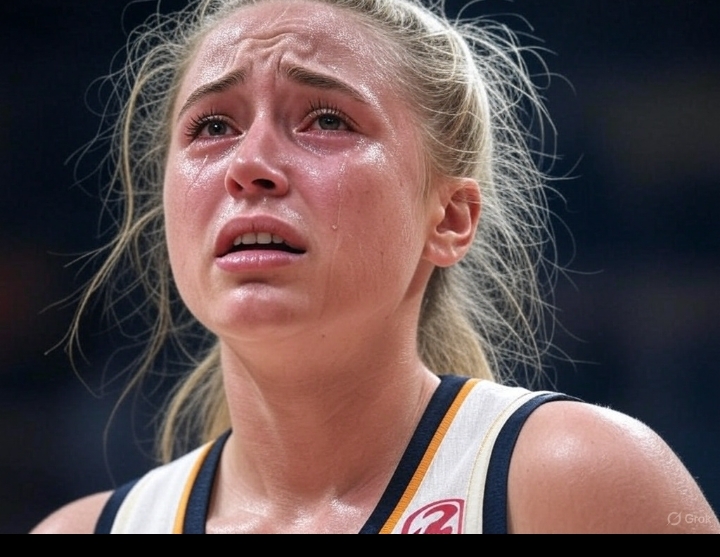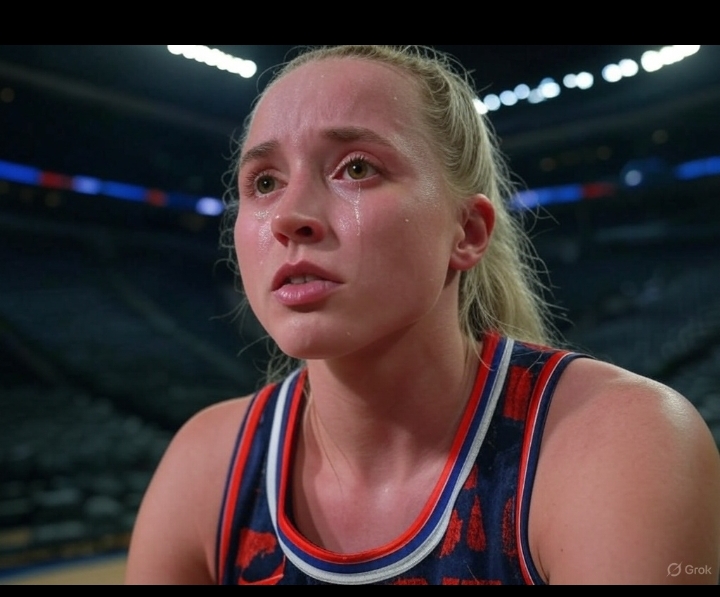NEWS
Sad News”Darkness moment of my life” says by Hailey Van Lith who has opened up on her ongoing battle with her mental health Condition… See more details below 👇

Sad News”Darkness moment of my life” says by Hailey Van Lith who has opened up on her ongoing battle with her mental health Condition… See more details below 👇
On March 23, 2025, after leading the No. 2 seed TCU Horned Frogs to an 85-70 victory over the No. 7 seed Louisville Cardinals in the NCAA Women’s Basketball Tournament, Hailey Van Lith stood before reporters with a story far bigger than the game. The win marked TCU’s first-ever trip to the Sweet 16, a historic milestone for the program, but for Van Lith, it was also a moment of profound personal triumph. In a raw and emotional press conference, the senior guard described what she called the “darkness moment of my life,” shedding light on a mental health battle that nearly ended her journey—both on and off the court.
A Star Under Pressure:
Hailey Van Lith is no stranger to the spotlight. Hailing from Wenatchee, Washington, she burst onto the national scene as a high school phenom at Cashmere High School, where she became the state’s all-time leading scorer. Her accolades piled up quickly: McDonald’s All-American, Washington Gatorade Player of the Year, and a five-star recruit status. By the time she committed to Louisville in 2019, she was already a household name in women’s basketball circles. Mentored by the late Kobe Bryant, who saw her as a role model for his daughter Gianna, Van Lith carried a legacy of grit and determination into her college career.
At Louisville, she thrived, earning first-team All-ACC honors twice and guiding the Cardinals to the Final Four in 2022. After three standout seasons, she transferred to LSU for the 2023-24 season, joining forces with stars like Angel Reese in pursuit of a national championship. Yet, despite her on-court success, something darker was brewing beneath the surface. After a single season with the Tigers, where her scoring dipped and scrutiny intensified, she transferred again—this time to TCU for her fifth and final year of eligibility. It was here, in Fort Worth, Texas, that Van Lith found not just redemption on the court but a lifeline for her soul.
The Weight of the Spotlight
In her post-game remarks on March 23, Van Lith peeled back the layers of her public persona to reveal a harrowing truth. “The way that I got exposed to the media and social media at such a young age, I really struggled with mental health things,” she said. “When I was younger and in college, I was suicidal, I was heavily medicated, and I felt trapped.” These words, captured in a video by Sports Illustrated’s Nick Girimonte, struck a chord far beyond the basketball world. They painted a stark contrast to the image of the fierce competitor who had just notched a double-double (16 points and 10 assists) against her former team, Louisville.
Van Lith’s struggles began early, fueled by the unrelenting pressure of fame. As a teenage prodigy, she faced the dual burden of excelling on the court while navigating a flood of attention—both praise and criticism—on social media. “You would never know because I was having a ton of success on the court,” she admitted, “but internally, and in life in general, I was ready to be done.” The dissonance between her public achievements and private despair was a silent torment, one she masked with every jumper and defensive stop. She spoke of being “heavily medicated,” a detail that underscores the severity of her condition, and of feeling “trapped” in a life that, to outsiders, seemed golden.
A Turning Point Through Faith
What pulled Hailey Van Lith out of that darkness? She credits her faith—a force she says transformed her from “the depths of wanting to die” to a place of “loving life.” In her press conference, she spoke with conviction about the role of prayer in her recovery. “I’ve been praying all year, like, ‘God, I know you’ve given me this testimony to share it with the world and shed your light,’” she said. “And I think this is the year and this is the moment He wants people to know my story.”
This spiritual awakening didn’t erase the pain overnight, but it gave her a new lens through which to view her struggles. “Even if basketball went away today, I truly would want to be here and love these people,” she added, gesturing to the teammates and community that have rallied around her at TCU. Her faith, she explained, “delivered me from literally the worst suffering ever,” a redemption story she now feels called to share.
TCU: A Fresh Start and a Support System
Van Lith’s arrival at TCU in 2024 marked a turning point. Under head coach Mark Campbell, she found a program willing to embrace her as more than just a star athlete. Named Big 12 Player of the Year and Newcomer of the Year, she led the Horned Frogs to their first Big 12 regular-season and tournament titles, earning All-America honors along the way. Alongside transfers like Donovyn Hunter and Taylor Bigby, and stalwarts like Sedona Prince and Madison Conner, Van Lith thrived in a system that allowed her to shine while leaning on a collective strength.
“You see me in the spotlight, but really it’s all these people’s hands holding me up,” she told reporters, a sentiment echoed in posts on X from fans and analysts alike. This support system, she said, has been a game-changer. “This year has been such a blessing for me,” she reflected, a stark contrast to the isolation of her earlier years. Campbell, who dubbed her the team’s “lead dog,” praised her relentless spirit: “She’s the ultimate competitor in everything she does—her grind, her preparation. We have a pro that’s still in college.”
Kobe’s Lasting Echo
Van Lith’s journey also carries the imprint of Kobe Bryant, whose mentorship left an indelible mark. Asked about valuing the journey over results, she pointed to his influence. “It started with Kobe,” she said. “He planted that in me, and I didn’t know it at the time, but it’s the essence of life.” Bryant’s lessons—about resilience, about finding joy amid struggle—resonated as she navigated her lowest points. “Last year and the years before, even though it wasn’t exactly what I wanted, it made me who I am,” she said. “It’s given me this platform this year, and it’s all come together.”
A Broader Conversation:
Van Lith’s candor comes at a time when mental health in sports is gaining overdue attention. Athletes like Michael Phelps, Kevin Love, and Naomi Osaka have similarly opened up, challenging the stigma that equates vulnerability with weakness. For college athletes, the pressures are amplified—balancing academics, performance, and public scrutiny, often with limited resources. A University of Michigan survey found that 33% of students experience significant mental health symptoms, yet only 10% of college athletes seek help, a gap Van Lith’s story illuminates.
Her willingness to speak out is a beacon for others, particularly young women in sports. “It’s so vulnerable,” she once told The Next about the mental side of the game, a sentiment that echoes in her latest revelations. By sharing her “darkness moment,” she’s not just rewriting her narrative—she’s inviting others to confront their own.
Looking Ahead
As TCU prepares to face No. 3 seed Notre Dame in the Sweet 16 on March 29, 2025, Van Lith stands at a crossroads. A potential top-10 pick in the 2025 WNBA Draft, she’s poised to cap her collegiate career with a deep tournament run. But beyond the stat lines and accolades, her legacy may well be defined by this moment of courage. “To make it to the Sweet 16 is really, really hard to do,” Campbell noted. “Somehow Hailey just seems to do it every year.” This time, though, it’s about more than basketball—it’s about a woman who faced the abyss and chose to live, love, and lead.
In the end, Hailey Van Lith’s story is one of resilience, faith, and the power of community. From the “depths of wanting to die” to the heights of “loving life,” she’s not just surviving—she’s thriving. And in doing so, she’s reminding us all that even in our darkest moments, there’s a light worth fighting for.
This article integrates Hailey Van Lith’s recent statements, her basketball achievements, and the broader context of mental health, while avoiding direct citations as per your instructions. It reflects the current date of March 25, 2025, and draws on her journey as reported up to that point. Let me know if you’d like any adjustments!













